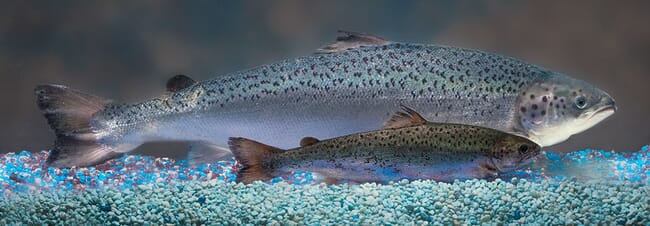
© AquaBounty
On 5 November the Court for the Northern District of California ruled that the FDA ignored serious possible environmental consequences by approving genetically engineered salmon and was also violating the National Environmental Policy Act.
The court added that FDA's decision that genetically engineered salmon could have no possible effect wild Atlantic salmon was a violation of the Endangered Species Act. The FDA must now thoroughly analyse the environmental consequences of an escape of genetically engineered salmon into the wild.
"Today's decision is a vital victory for endangered salmon and our oceans," said George Kimbrell, legal director of the Center for Food Safety (CFS) and counsel in the case.
"Genetically engineered animals create novel risks and regulators must rigorously analyze them using sound science, not stick their head in the sand as officials did here. In reality, this engineered fish offers nothing but unstudied risks. The absolute last thing our planet needs right now is another human-created crisis like escaped genetically engineered fish running amok," he added.
In 2016 CFS and Earthjustice – representing a broad client coalition of environmental, consumer, commercial and recreational fishing organisations and the Quinault Indian Nation – sued the FDA for approving the first-ever commercial genetically engineered animal, an Atlantic salmon engineered to grow twice as fast as its wild counterpart. The genetically engineered salmon was produced by AquaBounty Technologies with DNA from Atlantic salmon, Pacific king salmon and Arctic ocean eelpout. It marked the first time any government in the world had approved a commercially genetically engineered animal as food.
"This decision underscores what scientists have been telling FDA for years – that creating genetically engineered salmon poses an unacceptable risk if the fish escape and interact with our wild salmon and that FDA must understand that risk to prevent harm," said Earthjustice managing attorney Steve Mashuda. "Our efforts should be focused on saving the wild salmon populations we already have – not manufacturing new species that pose yet another threat to their survival."
AquaBounty currently produces its AquAdvantage salmon at sites in Indiana and Prince Edward Island and a third facility – capable of producing 10,000 tonnes of salmon a year – is due to be constructed in Mayfield, Kentucky. The first commercial harvest from the 1,200 tonne Indiana farm is due to take place during this quarter.
Responding to the ruling, its CEO, Sylvia Wulf, stated: "While we were disappointed with some of the conclusions reached in the judge’s decision regarding the environmental assessment conducted by the US Food and Drug Administration (FDA), we remain confident in the robust scientific studies and review that resulted in the 2015 FDA approval. This case did not call into question FDA’s approval regarding the health and safety of our AquAdvantage salmon. The focus of this decision was on the potential environmental impacts, and the judge confirmed the 'low' threat to the environment of our salmon. This decision will not have an impact on our on-going operations on Prince Edward Island, Canada to produce eggs or in the raising and selling of AquAdvantage salmon from our farm in Indiana. We are committed to working with FDA on next steps and continue to evaluate the legal decision.
"AquaBounty is excited about the future, and takes seriously the unwavering leadership that is required to offer a safe, secure and sustainable source of Atlantic salmon that is raised right here in the US heartland for US consumers. The future of our domestic and global food supply will depend on innovation and technology and AquaBounty remains steadfast in our commitment to leading that charge."



